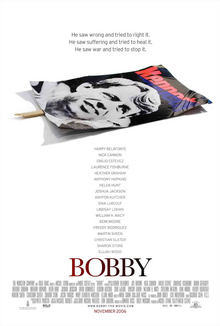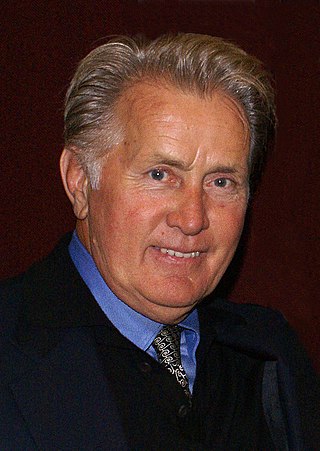
Ramón Antonio Gerardo Estévez, known professionally as Martin Sheen, is an American actor. In a career spanning six decades he received numerous accolades including three Emmy Awards, a Golden Globe Award, and four Screen Actors Guild Awards.
The Brat Pack is a nickname given to a group of young actors who frequently appeared together in teen-oriented coming-of-age films in the 1980s. The term "Brat Pack", a play on the Rat Pack from the 1950s and 1960s, was first popularized in a 1985 New York magazine cover story, which described a group of highly successful film stars in their early twenties. David Blum wrote the article after witnessing several young actors being mobbed by groupies at Los Angeles' Hard Rock Cafe. The group has been characterized by the partying of members such as Robert Downey Jr., Emilio Estevez, Rob Lowe, and Judd Nelson.
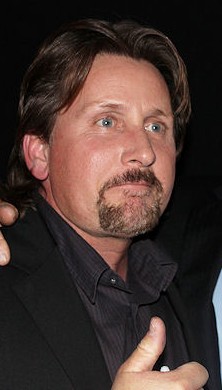
Emilio Estevez is an American actor and filmmaker.

The Ambassador Hotel was a hotel in Los Angeles, California. Designed by architect Myron Hunt, the Ambassador Hotel formally opened to the public on January 1, 1921. Later renovations by architect Paul Williams were made to the hotel in the late 1940s. It was also home to the Cocoanut Grove nightclub, a premier Los Angeles night spot for decades; host to six Oscar ceremonies and to every United States President from Herbert Hoover to Richard Nixon.

Young Guns II is a 1990 American Western action film and a sequel to Young Guns (1988). It stars Emilio Estevez, Kiefer Sutherland, Lou Diamond Phillips, and Christian Slater, and features William Petersen as Pat Garrett. It was written by John Fusco and directed by Geoff Murphy.

Roosevelt "Rosey" Grier is an American actor, singer, Protestant minister, and former professional football player. He was a notable college football player for Pennsylvania State University who earned a retrospective place in the National Collegiate Athletic Association 100th anniversary list of 100 most influential student athletes. A professional player for twelve seasons, Grier was a member of the New York Giants and the original Fearsome Foursome of the Los Angeles Rams. He played in the Pro Bowl twice.
The Kennedy curse is a series of deaths, accidents, assassinations, and other calamities involving members of the American Kennedy family. The alleged curse has primarily struck the descendants of businessman Joseph P. Kennedy Sr., but it has also affected family friends, associates, and other relatives. Political assassinations and plane crashes have been the most common manifestations of the "curse". Following the Chappaquiddick incident in 1969, Ted Kennedy is quoted saying he questioned if "some awful curse did actually hang over all the Kennedys." However skeptics argue that it is not improbable for a large extended family to experience similar events over the course of several generations.
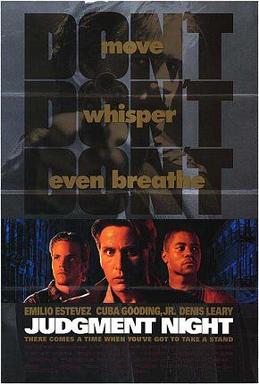
Judgment Night is a 1993 American action film directed by Stephen Hopkins. Emilio Estevez, Cuba Gooding Jr., Jeremy Piven and Stephen Dorff star as a group of friends on the run from a gang of drug dealers after they witness a murder.

That Was Then... This Is Now is a 1985 American drama film based on the novel of the same name by S. E. Hinton. The film was directed by Christopher Cain, distributed by Paramount Pictures, and stars Emilio Estevez and Craig Sheffer.
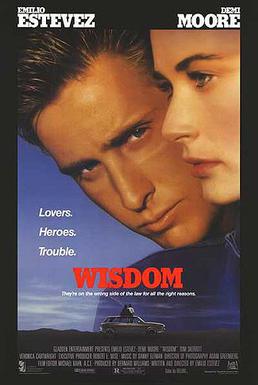
Wisdom is a 1986 American romantic crime film written and directed by its star Emilio Estevez in his filmmaking debut. The film also stars Demi Moore, along with Tom Skerritt and Veronica Cartwright as Estevez's parents. The ending credits song is "Home Again" by Oingo Boingo and the score by Danny Elfman.

RFK Must Die: The Assassination of Bobby Kennedy is a 2007 investigative documentary by Irish writer and filmmaker Shane O'Sullivan. The film expands on O'Sullivan's earlier reports for BBC Newsnight and The Guardian and explores conspiracy theories related to the assassination of United States Senator Robert F. Kennedy on 5 June 1968. The title comes from a page of "free writing" found in assassin Sirhan Sirhan's notebook after the shooting upon which Sirhan had written "R.F.K. must die - RFK must be killed Robert F. Kennedy must be assassinated... before June 5 '68."

On June 5, 1968, Robert F. Kennedy was shot by Sirhan Sirhan at the Ambassador Hotel in Los Angeles, California and pronounced dead the following day.

Sirhan Bishara Sirhan is a Palestinian-Jordanian man who was convicted of murdering Senator Robert F. Kennedy, the younger brother of American president John F. Kennedy. On June 5, 1968, Sirhan shot and mortally wounded Robert Kennedy shortly after 12 midnight at the Ambassador Hotel in Los Angeles; Kennedy died the next day at Good Samaritan Hospital. The circumstances surrounding the attack, which took place five years after John's assassination, have led to numerous conspiracy theories.
There are several non-standard accounts of Robert F. Kennedy's assassination, which took place shortly after midnight on June 5, 1968, in Los Angeles, California. Kennedy was assassinated at the Ambassador Hotel, during celebrations following his successful campaign in California's primary elections as a leading 1968 Democratic presidential candidate; he died the following day at Good Samaritan Hospital.
Robert F. Kennedy visited the British Mandate of Palestine in 1948, one month before Israel declared its independence. Twenty-two years old at the time, he was reporting on the tense situation in the region for The Boston Post. During his stay, he grew to admire the Jewish inhabitants of the area. He later became a strong supporter of Israel; this was later cited as Sirhan Sirhan's alleged motivation for assassinating him on the first anniversary of the start of the Six-Day War on June 5, 1968. Sirhan happened to see a documentary about Kennedy in Palestine in 1948. Later in his murder trial, Sirhan Sirhan testified: "I hoped he will win Presidency until that moment. But when I saw, heard, he was supporting Israel, sir, not in 1968, but he was supporting, it from all the way from its inception in 1948, sir ..." Author Robert Blair Kaiser points out a discrepancy in the timing of Sirhan's decision. In Sirhan's diary, the entry in which he decided to kill Robert Kennedy was made on May 18. The documentary in question was first shown on TV in the Los Angeles area on May 20. When asked to explain, Sirhan said that he did not recall writing the journal.

The Way is a 2010 drama film directed, produced and written by Emilio Estevez and starring Martin Sheen, Deborah Kara Unger, James Nesbitt, and Yorick van Wageningen. In it, Martin Sheen's character walks the Camino de Santiago, a traditional pilgrimage route in France and Spain.

Evan Phillip Freed is an attorney and freelance photographer who traveled with and photographed the presidential campaign of United States Senator Robert F. Kennedy. Freed was present when Sirhan Sirhan shot Kennedy.

The Killing of America is a 1981 Japanese–American documentary and mondo film directed by Sheldon Renan and Leonard Schrader. The film was premiered in New York City in February 1982 and was shown at the 2013 Fantasia Festival.

The Girl in the Polka Dot Dress is the last novel by writer Beryl Bainbridge published in 2011 following her death. As explained in the postscript:
Beryl Bainbridge was in the process of finishing The Girl in the Polka Dot Dress when she died on 2 July 2010. Her long-time friend and editor, Brendan King prepared the text for publication from her working manuscript, taking into account suggestions Beryl made at the end of her life. No additional material has been included.

Paul Schrade was an American trade union activist. While vice president of the United Auto Workers, he was shot in the head during the 1968 assassination of Robert F. Kennedy. Schrade believed that while he was shot by Sirhan Sirhan, Kennedy was shot by a second gunman.
